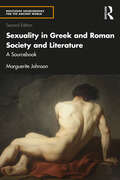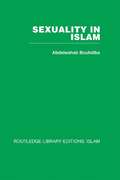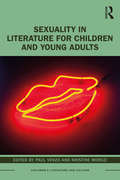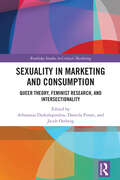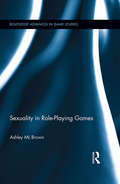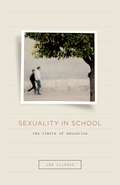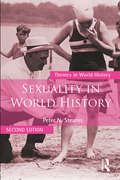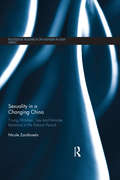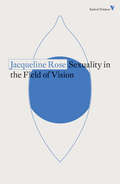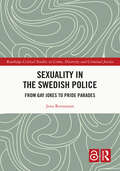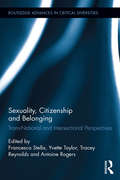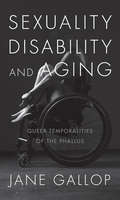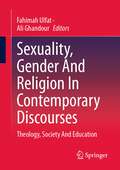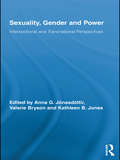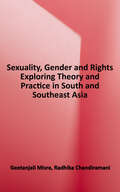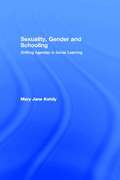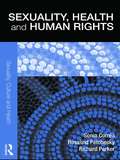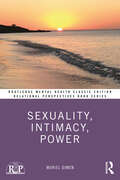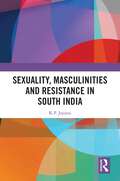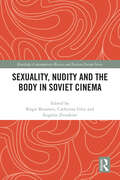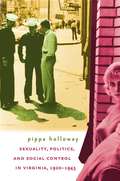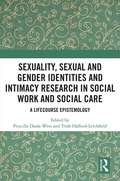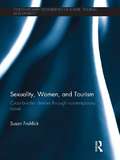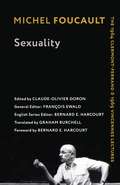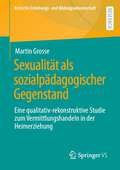- Table View
- List View
Sexuality in Greek and Roman Society and Literature: A Sourcebook (Routledge Sourcebooks for the Ancient World)
by Marguerite JohnsonThis second edition includes an updated review of sexuality in Greece and Rome, an expanded bibliography and numerous new passages with original translations. This book provides readers with detailed information, notes, and original translated passages on the fascinating and multi-faceted theme of ancient sexuality. The sources range from the era of Homer and Hesiod through to the Graeco-Roman world of the Fourth Century CE and explore the diversitiy of approaches to sexuality and sexual expression, as well as how these issues relate to the rest of ancient society and culture. Sexuality in Greek And Roman Society and Literature is an invaluable resource to students and academics alike, providing a detailed series of chapters on all major facets of sexuality in ancient Greece and Rome. It will particularly appeal to those interested in sexuality and gender in antiquity, as well as ancient literature and social studies.
Sexuality in Islam (Routledge Library Editions: Islam #20)
by Abdelwahab BouhdibaBeginning with the Qur’an, Abdelwahab Bouhdiba confronts the question of male supremacy in Islam, and the strict separation of the masculine and the feminine. He gives an account of purification practices, of Islamic attitudes towards homosexuality, concubinage, legal marriage and of the sexual taboos laid down by the Qur’an. He assesses present-day sexual practice, including eroticism, misogyny and mysticism and concludes that the sexual alienation – and even oppression – of modern Muslim women is the result not of the Islamic vision of sexuality, but of social and economic pressures.
Sexuality in Literature for Children and Young Adults (Children's Literature and Culture)
by Paul VenzoExpanding outward from previous scholarship on gender, queerness, and heteronormativity in children’s literature, this book offers fresh insights into representations of sex and sexuality in texts for young people. In this collection, new and established scholars examine how fiction and non-fiction writing, picture books, film and television and graphic novels position young people in relation to ideologies around sexuality, sexual identity, and embodiment. This book questions how such texts communicate a sense of what is possible, impossible, taboo, or encouraged in terms of being sexual and sexual being. Each chapter is motivated by a set of important questions: How are representations of sex and sexuality depicted in texts for young people? How do these representations affect and shape the kinds of sexualities offered as models to young readers? And to what extent is sexual diversity acknowledged and represented across different narrative and aesthetic modes? This work brings together a diverse range of conceptual and theoretical approaches that are framed by the idea of sexual becoming: the manner in which texts for young people invite their readers to assess and potentially adopt ways of thinking and being in terms of sex and sexuality.
Sexuality in Marketing and Consumption: Queer Theory, Feminist Research, and Intersectionality (Routledge Studies in Critical Marketing)
by Athanasia Daskalopoulou Daniela Pirani Jacob OstbergThis volume provides an in-depth examination of the role of sexuality in consumers’ life course and in the marketing of products and services.Leading scholars in the field define the most up-to-date picture of theories of sexuality in marketing and consumer research, mapping the topic through diverse theoretical lenses, addressing queer and feminist research, and putting sexuality and consumption in context. The book brings together leading international marketing scholars to build on the growing interest in theories of sexuality, queer theory, and intersectionality, which are gaining more interest among institutions and researchers interested in equality and diversity. While this book builds on existing expertise in consumer culture scholarship, it is the first time a marketing book focuses on sexuality, adding value to the existing repertoire in gender and feminist literature. The chapters are organised into three key sections: Part 1 maps the marketing and consumer research field, discussing how sexuality can be studied through different lenses; Part 2 focuses on queer and feminist theorising, drawing on LGBTQIA+ theory, queer theory, and theories of intersectionality to analyse how overlapping social categories interact to influence consumer behaviour, identity, and experiences in the marketplace; and Part 3 explores the personal and social aspects of sexuality, offering a broad overview of issues of gender and sexuality, digitalisation, and the sexual body.This text will be of direct interest to scholars and researchers within the fields of marketing, consumer research, sociology, and media studies. The aim of this book is to help scholars and students to develop a broader understanding about the interplay between sexuality, society, and the market.
Sexuality in Role-Playing Games (Routledge Advances in Game Studies)
by Ashley ML BrownRole-playing games offer a chance to pretend, make believe, and share fantasy. They often invoke heavy themes into their game play: morality, violence, politics, spirituality, or sexuality. Although interesting moral debates perennially appear in the media and academia concerning the appropriateness of games’ ability to deal with such adult concepts, very little is known about the intersection between games, playfulness, and sexuality and what this might mean for players. This book offers an in-depth, ethnographic look into the phenomenon of erotic role-play through the experiences of players in multiplayer and tabletop role-playing games. Brown explores why participants engage in erotic role-play; discusses the rules involved in erotic role-play; and uncovers what playing with sexuality in ludic environments means for players, their partners, and their everyday lives. Taken together, this book provides a rich, nuanced, and detailed account of a provocative topic.
Sexuality in School: The Limits of Education
by Jen GilbertFrom concerns over the bullying of LGBTQ youth and battles over sex education to the regulation of sexual activity and the affirmation of queer youth identity, sexuality saturates the school day. Rather than understand these conflicts as an interruption to the work of education, Jen Gilbert explores how sexuality comes to bear on and to enliven teaching and learning. Gilbert investigates the breakdowns, clashes, and controversies that flare up when sexuality enters spaces of schooling. Education must contain the volatility of sexuality, Gilbert argues, and yet, when education seeks to limit the reach of sexuality, it risks shutting learning down. Gilbert penetrates this paradox by turning to fiction, film, legal case studies, and personal experiences. What, she asks, can we learn about school from a study of sexuality? By examining the strange workings of sexuality in schools, Gilbert draws attention to the explosive but also compelling force of erotic life in teaching and learning. Ultimately, this book illustrates how the most intimate of our experiences can come to shape how we see and act in the world.
Sexuality in World History (Themes in World History)
by Peter N. StearnsThis book examines sexuality in the past, and explores how it helps explain sexuality in the present. The subject of sexuality is often a controversial one, and exploring it through a world history perspective emphasizes the extent to which societies, including our own, are still reacting to historical change through contemporary sexual behaviors, values, and debates. The study uses a clear chronological structure to focus on major patterns and changes in sexuality—both sexual culture and sexual behaviors—in the main periods of world history, covering topics including: • The sexual implications of the transition from hunting and gathering economies to agricultural economies; • Sexuality in classical societies; • The postclassical period and the spread of the world religions; • Sex in an age of trade and colonies; • Changes in sexual behaviors and sexual attitudes between 1750 and 1950; • Sex in contemporary world history. This new edition examines these issues on a global scale, with attention to anthropological insights on sexuality and their relationship to history, the dynamics between sexuality and imperialism, sexuality in industrial society, and trends and conflicts surrounding views of sex and sexuality in the contemporary world.
Sexuality in a Changing China: Young Women, Sex and Intimate Relations in the Reform Period (Routledge Research on Gender in Asia Series)
by Nicole ZarafonetisLibrary of Congress Cataloging-in-Publication DataNames: Zarafonetis, Nicole, author.Title: Sexuality in a changing China : young women, sex and intimate relations in the reform period / Nicole Zarafonetis.Description: New York, NY : Routledge, 2017. | Series: Routledge research on gender in Asia series | Includes bibliographical references and index.Identifiers: LCCN 2017001825| ISBN 9781138240148 (hardback) | ISBN 9781315293936 (ebook)Subjects: LCSH: Sex--China. | Sex instruction--China. | Sex role--China. | Dating (Social customs)--China. | Marriage--China. | Women--China--Social conditions.Classification: LCC HQ18.C6 Z37 2017 | DDC 306.70951--dc23LC record available at https://lccn.loc.gov/2017001825
Sexuality in the Field of Vision (Radical Thinkers Ser.)
by Jacqueline RoseA brilliantly original exploration of the interface between feminism, psychoanalysis, semiotics and film theory.
Sexuality in the Swedish Police: From Gay Jokes to Pride Parades (Routledge Critical Studies In Crime, Diversity And Criminal Justice Ser.)
by Jens RennstamSexuality in the Swedish Police is based on the experiences of lesbian, gay, and bisexual police officers and the author's observations of police work. Written at the intersection of organizational, gender, and police studies, the book analyses how processes of exclusion and inclusion of LGB sexuality coexist in the Swedish police, how these processes are related to the culture and characteristics of police work, and how police management attempts to create an inclusive organization. How and under what conditions does the exclusion and inclusion of LGB officers and LGB sexuality take place in the Swedish police? By delving into this question, the author seeks to answer, among other things, how it is that there are so few openly gay male police officers and how barriers to inclusion can be understood. The book contributes to a better understanding of the problems and activities associated with diversity issues, particularly with a focus on sexual orientation, but also more generally; many of the insights in the book can be used to understand the inclusion and exclusion of other groups in society. A key insight from the book is that inclusion and exclusion are collective processes characterized by struggle, a struggle that according to the author can be understood through the concept of “peripheral inclusion”. Sexuality in the Swedish Police will be of great interest to scholars and students as well as practitioners with an interest in diversity issues and policing. The book is also relevant to those working in or interested in diversity, inclusion, and equality in other similarly "masculinized" organizations, such as the armed forces and certain sports organizations. The Open Access version of this book, available at www.taylorfrancis.com, has been made available under a Creative Commons Attribution-Non Commercial-No Derivatives 4.0 license.
Sexuality, Citizenship and Belonging: Trans-National and Intersectional Perspectives (Routledge Advances in Critical Diversities)
by Yvette Taylor Francesca Stella Tracey Reynolds Antoine RogersThis book brings together a diverse range of critical interventions in sexuality and gender studies, and seeks to encourage new ways of thinking about the connections and tensions between sexual politics, citizenship and belonging. The book is organized around three interlinked thematic areas, focusing on sexual citizenship, nationalism and international borders (Part 1); sexuality and "race" (Part 2); and sexuality and religion (Part 3). In revisiting notions of sexual citizenship and belonging, contributors engage with topical debates about "sexual nationalism," or the construction of western/European nations as exceptional in terms of attitudes to sexual and gender equality vis-à-vis an uncivilized, racialized "Other." The collection explores macro-level perspectives by attending to the geopolitical and socio-legal structures within which competing claims to citizenship and belonging are played out; at the same time, micro-level perspectives are utilized to explore the interplay between sexuality and "race," nation, ethnicity and religious identities. Geographically, the collection has a prevalently European focus, yet contributions explore a range of trans-national spatial dimensions that exceed the boundaries of "Europe" and of European nation-states.
Sexuality, Disability, and Aging: Queer Temporalities of the Phallus
by Jane GallopDrawing on her own experiences with late-onset disability and its impact on her sex life, along with her expertise as a cultural critic, Jane Gallop explores how disability and aging work to undermine one's sense of self. She challenges common conceptions that equate the decline of bodily potential and ability with a permanent and irretrievable loss, arguing that such a loss can be both temporary and positively transformative. With Sexuality, Disability, and Aging, Gallop explores and celebrates how sexuality transforms and becomes more queer in the lives of the no longer young and the no longer able while at the same time demonstrating how disability can generate new forms of sexual fantasy and erotic possibility.
Sexuality, Gender And Religion In Contemporary Discourses: Theology, Society And Education
by Fahimah Ulfat Ali GhandourOne of the most current issues occupying both public and academic discourse is sexuality and the related issues of sexual self-determination, gender order, and homophobia. Religion has a significant role to play in this discourse. This centrality of religion is evident not only in the question of moral concepts, but also in questions of the understanding of the body and gender. In this context, it should be emphasized that religion - or, more precisely, a particular interpretation of the religious - can have both a conflict-promoting and an emancipatory effect. If one wants to conceptualize a contemporary theological understanding, then it is necessary to receive medical, psychological as well as social and cultural science research. The anthology aims to thematize these debates and to broaden the view for the multi-layered processes of change taking place in the discourses.
Sexuality, Gender and Power: Intersectional and Transnational Perspectives (Routledge Advances in Feminist Studies and Intersectionality)
by Anna G. JónasdóttirBringing together essays by a distinguished international group of leading and emerging scholars of sexuality and gender, this stimulating and accessible collection explores a range of theoretical and "real world" perspectives current in the field. Treating these approaches as complementary, Sexuality, Gender and Power fosters critical conversations about sexuality across disciplinary, cultural, national and ideological boundaries. Underpinned by a broad editorial commitment to intersectionality, the chapters deploy approaches that range from historical materialism to queer theory, and from contract theory to theories of the gendered sexual self to address recurrent questions around agency, power, identity and self-hood. Theoretical debates inform and are informed by more empirically oriented chapters focusing on topics such as gay identity in contemporary Croatia, sexual politics in the Commonwealth Caribbean, western "tango tourists," sexual violence in war, prostitution, femme fashion, changing sexual norms in China and Taiwan, and feminist politics in the 2008 US presidential campaign. Each chapter is interesting and important in its own right; taken together, they advance gender theory and research by developing a complex conception of sexuality that explores intersections between and amongst theories, levels of analysis and identities, linking case studies to international trends and theoretical debates to everyday experiences.
Sexuality, Gender and Rights: Exploring Theory and Practice In South and Southeast Asia
by Geetanjali Misra Radhika ChandiramaniThere is virtually no record of work on sexuality and rights in South and Southeast Asia and even less to show how theory can link to practice. This volume fills the gap by demonstrating how the ideas of scholars and activists can be converted into action that can make a difference to people′s lives. The 15 original essays span eight countries and analytically document on-going work in areas such as: sexuality education; sexual health services; sexual rights; transexuality; and HIV/AIDS prevention. They also offer a variety of strategies in advocacy, service delivery, education, training and media outreach activities.
Sexuality, Gender and Schooling: Shifting Agendas in Social Learning
by Mary Jane KehilyThe sexuality of young people arouses controversy and remains a source of concern for parents, teachers, policy-makers and politicians. But what young people really think about sexuality and gender and how these issues impact upon their lives is often marginalized or overlooked. Based upon extensive ethnographic research with young people and teachers, Sexuality, Gender and Schooling offers a telling and insightful account of how young people acquire sexual knowledge and how they enact their understanding of their own gender. It highlights the ways in which young people's constructions of gender and sexuality are formed outside the school curriculum, through engagements with various forms of popular culture - such as teen magazines and television programmes - and through same-sex friendship groups. Offering a fresh perspective on a subject of perennial interest and concern, Sexuality, Gender and Schooling provides accounts from the inside - some of which may challenge and eclipse current approaches to sexuality education. It has significant implications for policy and practice in Personal, Social and Health Education and is also an excellent introduction to key debates and issues in the study of gender and sexuality.
Sexuality, Health and Human Rights (Sexuality, Culture and Health)
by Richard Parker Sonia Corrêa Rosalind PetcheskyThis new work surveys how rapid changes taking place at the start of the twenty-first century in social, cultural, political and economic domains impact on sexuality, health and human rights. The relationships between men, women and children are changing quickly, as are traditional family structures and gender norms. What were once viewed as private matters have become public, and an array of new social movements – transgender, intersex, sex worker, people living with HIV – have come into the open. The book is split into three sections: Global ‘Sex’ Wars – discusses the notion of sexualities, its political landscapes internationally, and the return of religious fervour and extremism Epistemological Challenges and Research Agendas – examines modern ‘scientific’ understandings of sexuality, its history and the way in which AIDS has drawn attention to sexuality The Promises and Limits of Sexual Rights – discusses human rights approaches to sexuality, their strengths and limitations and new ways of imagining erotic justice Offering a unique framework for understanding this new world, set in the context of the major theoretical debates of recent decades, this book will be of interest to professionals, advocates and policy researchers and is suitable for a wide range of courses covering areas such as gender studies, human sexuality, public health and social policy.
Sexuality, Intimacy, Power: Classic Edition (Relational Perspectives Book Series)
by Muriel DimenThis book offers Dimen’s classic take on psychosexuality, drawing on relational theory, feminism and postmodernism, with a new foreword by Virginia Goldner and Velleda Ceccoli honouring the late Muriel Dimen and introducing a new audience to her profound legacy. For Dimen, the shift from dualism to multiplicity that has reshaped a range of disciplines can also be brought to bear on our thinking about sexuality. She urges us to return to the open-mindedness hiding between the lines and buried in the footnotes of Freud’s writings, and to replace the determinism into which his thought has hardened with more fluid notions of contingency, paradox, and thirdness. By unveiling the colloquy among psychoanalysis, social theory, and feminism, Dimen challenges clinicians and academicians alike to rethink ideas about gender, eroticism, and perversion. She explores, among other topics, the relations between lust and libido; the limitations of Darwinian thought in theorizing homosexuality; the body as projective test; and the intimate tangle of love and hate between women. Generous clinical examples illustrate the ways in which a radical re-visioning of psychosexuality benefits therapists and patients alike. A brilliant example of contemporary psychoanalytic theory at its destabilizing best, Sexuality, Intimacy, Power covers both clinical insights and theoretical rethinking that is invaluable for psychoanalysts, psychotherapists, and students of women’s, gender and queer studies.
Sexuality, Masculinities and Resistance in South India
by K.P. JayarajSexuality, Masculinities and Resistance in South India unravels the relations of domination, subordination, and resistance in the context of sexuality and masculinities in contemporary Malabar, South India.Exploring a taxonomy of masculinities, based on the lived experiences of gender and sexual non-conforming men, this book documents the hierarchical character of masculine articulations on the one hand, and forms of everyday resistance to hegemonic masculinity, on the other. It proposes a broad project of social transformation, inclusive of struggles by feminist groups, which should also engage with socially ‘non-conforming’ collectives to challenge the power of masculinities.Sexuality, Masculinities and Resistance in South India will be a valuable text for students and researchers in gender, sexuality, and queer studies, as well as for professionals and activists in these areas.
Sexuality, Nudity and the Body in Soviet Cinema (Routledge Contemporary Russia and Eastern Europe Series)
by Beumers, Edited by BirgitThis book explores evocations of and allusions to sexual desire in Soviet cinema, 1919–1991.By deploying several lines of investigation – from the cult of the masculine, strong body in Stalinist cinema to the shifting signification of the naked body (male and female) in post-war cinema and to the display of a sexualised body in the late Soviet era – this book establishes the extent to which Soviet cinema actually did reveal sexuality. It also explores how external political and social factors impacted representation. Overall, the contributions challenge the narrative of Soviet cinema as an art form where the representation of sexuality was taboo and outline shifts in the concepts of the naked and sexualised body, of sexuality and sexual relationships.This book will be of interest to scholars and researchers in the field of film studies, Slavic and Soviet studies, cultural studies, politics and gender studies.
Sexuality, Politics, and Social Control in Virginia, 1920-1945
by Pippa HollowayIn the first half of the twentieth century, white elites who dominated Virginia politics sought to increase state control over African Americans and lower-class whites, whom they saw as oversexed and lacking sexual self-restraint. In order to reaffirm the existing political and social order, white politicians legalized eugenic sterilization, increased state efforts to control venereal disease and prostitution, cracked down on interracial marriage, and enacted statewide movie censorship. Providing a detailed picture of the interaction of sexuality, politics, and public policy, Pippa Holloway explores how these measures were passed and enforced.The white elites who sought to expand government's role in regulating sexual behavior had, like most southerners, a tradition of favoring small government, so to justify these new policies, they couched their argument in economic terms: a modern, progressive government could provide optimum conditions for business growth by maintaining a stable social order and a healthy, docile workforce. Holloway's analysis demonstrates that the cultural context that characterized certain populations as sexually dangerous worked in tandem with the political context that denied them the right to vote. This perspective on sexual regulation and the state in Virginia offers further insight into why white elite rule mattered in the development of southern governments.
Sexuality, Sexual and Gender Identities and Intimacy Research in Social Work and Social Care: A Lifecourse Epistemology
by Trish Hafford-Letchfield Priscilla Dunk-WestUntil now, sexuality has been treated as a specialist topic or area of specialist social work practice. This book cuts across all areas of the discipline. It examines the relationship between sexuality, sexual identities and intimacies and the life course, and showcases a range of issues pertinent to social work through these lenses. It opens up new possibilities for better understanding sexuality in social work, and contains empirical work and theorising about sexuality, intimacy and gender not currently found in a traditional course on life course theory and practice. The chapters position new areas of scholarship in sexuality including trans perspectives, masculinities, bisexuality and the voices of other gender and sexual minority populations within a life course trajectory. Empirical research picks up on the broader public health and well-being agenda with a strong focus on challenging normative theories to promote human rights and justice for marginalised individuals and groups. Sexuality, Sexual and Gender Identities and Intimacy Research in Social Work and Social Care will significantly enhance any core texts on life course theory and practice, anti-oppression and anti-discriminatory theories for professionals. It should be considered essential reading for academics, practitioners and undergraduate and postgraduate students.
Sexuality, Women, and Tourism: Cross-Border Desires through Contemporary Travel (Contemporary Geographies of Leisure, Tourism and Mobility #35)
by Susan FrohlickThis book is the first to focus on why and how foreign Western women engage in cross-border sexual and intimate relations as tourists travelling, or temporarily dwelling, in a Central American country. As an in-depth ethnographic account, the book traces the experiences of heterosexual North American and European women’s transnational encounters, and examines new sexual and social practices arising from contemporary global tourism, shifting sexual cultures both at home and abroad, consumer culture, and women’s increasing mobility. The book combines descriptions of women’s travels and sexual relations across racial and class boundaries with feminism, postcolonial theory, and poststructuralist theories of gender and sexuality, to show how tourism as a wide range and set of desires serves as a central shaping force in the formation of women’s sexual subjectivities in contemporary life in postindustrial capitalism. In doing so it offers new insights into how tourist women express heterosexuality shaped by gender, race, class, and identities. This fascinating book, focusing on the structure of tourism and role of local culture and social organization in the shoring-up of desire, develops a unique contribution to the understanding of sex tourism. It will be of interest not only to tourism scholars, but also to those interested in sexuality, anthropology, sociology, cultural studies, women studies, gender studies, and geography.
Sexuality: The 1964 Clermont-Ferrand and 1969 Vincennes Lectures (Foucault's Early Lectures and Manuscripts)
by Michel FoucaultMichel Foucault’s The History of Sexuality—the first volume of which was published in 1976—exerts a vast influence across the humanities and social sciences. However, Foucault’s interest in the history of sexuality began as early as the 1960s, when he taught two courses on the subject. These lectures offer crucial insight into the development of Foucault’s thought yet have remained unpublished until recently.This book presents Foucault’s lectures on sexuality for the first time in English. In the first series, held at the University of Clermont-Ferrand in 1964, Foucault asks how sexuality comes to be constituted as a scientific body of knowledge within Western culture and why it derived from the analysis of “perversions”—morbidity, homosexuality, fetishism. The subsequent course, held at the experimental university at Vincennes in 1969, shows how Foucault’s theories were reoriented by the events of May 1968; he refocuses on the regulatory nature of the discourse of sexuality and how it serves economic, social, and political ends. Examining creators of political and literary utopias in the nineteenth and twentieth centuries, from Sade to Fourier to Marcuse, who attempted to integrate “natural” sexualities, including transgressive forms, into social and economic life, Foucault elaborates a double critique of the naturalization and the liberation of sexuality. Together, the lectures span a range of interests, from abnormality to heterotopias to ideology, and they offer an unprecedented glimpse into the evolution of Foucault’s transformative thinking on sexuality.
Sexualität als sozialpädagogischer Gegenstand: Eine qualitativ-rekonstruktive Studie zum Vermittlungshandeln in der Heimerziehung (Kritische Erziehungs- und Bildungswissenschaft)
by Martin GrosseDie Studie befasst sich mit Sexualität in der Heimerziehung. Hierbei wird ein Zugang gewählt, der Sexualität als sozialpädagogischen Gegenstand konturiert und vor diesem Hintergrund danach fragt, wie Pädagog*innen diesen in vermittelnder Weise den Adressat*innen (re-)präsentieren. Auf der Grundlage von Interaktionsprotokollen nimmt die Studie das Vermittlungshandeln sowohl auf der Ebene der Gegenstandskonstituierung sowie der Ebene der Interaktionsgestaltung in den Blick. Darüber werden Einblicke in pädagogisches Handeln geliefert, wie das kriseninduzierte Thema der Sexualität im Kontext der Heimerziehung hergestellt und bearbeitet wird.
